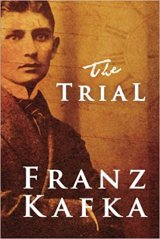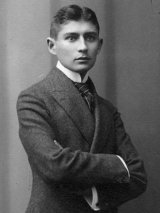The Trial Page #9
The Trial is a novel written by Franz Kafka between 1914 and 1915 and published posthumously on 26 April 1925. One of his best-known works, it tells the story of Josef K., a man arrested and prosecuted by a remote, inaccessible authority, with the nature of his crime revealed neither to him nor to the reader. Heavily influenced by Dostoevsky's Crime and Punishment and The Brothers Karamazov, Kafka even went so far as to call Dostoevsky a blood relative. Like Kafka's other novels, The Trial was never completed, although it does include a chapter which appears to bring the story to an intentionally abrupt ending.
Chapter Two First Cross-examination K. was informed by telephone that there would be a small hearing concerning his case the following Sunday. He was made aware that these cross examinations would follow one another regularly, perhaps not every week but quite frequently. On the one hand it was in everyone's interest to bring proceedings quickly to their conclusion, but on the other hand every aspect of the examinations had to be carried out thoroughly without lasting too long because of the associated stress. For these reasons, it had been decided to hold a series of brief examinations following on one after another. Sunday had been chosen as the day for the hearings so that K. would not be disturbed in his professional work. It was assumed that he would be in agreement with this, but if he wished for another date then, as far as possible, he would be accommodated. Cross-examinations could even be held in the night, for instance, but K. would probably not be fresh enough at that time. Anyway, as long as K. made no objection, the hearing would be left on Sundays. It was a matter of course that he would have to appear without fail, there was probably no need to point this out to him. He would be given the number of the building where he was to present himself, which was in a street in a suburb well away from the city centre which K. had never been to before. Once he had received this notice, K. hung up the receiver without giving an answer; he had decided immediately to go there that Sunday, it was certainly necessary, proceedings had begun and he had to face up to it, and this first examination would probably also be the last. He was still standing in thought by the telephone when he heard the voice of the deputy director behind him - he wanted to use the telephone but K. stood in his way. "Bad news?" asked the deputy director casually, not in order to find anything out but just to get K. away from the device. "No, no," said K., he stepped to one side but did not go away entirely. The deputy director picked up the receiver and, as he waited for his connection, turned away from it and said to K., "One question, Mr. K.: Would you like to give me the pleasure of joining me on my sailing boat on Sunday morning? There's quite a few people coming, you're bound to know some of them. One of them is Hasterer, the state attorney. Would you like to come along? Do come along!" K. tried to pay attention to what the deputy director was saying. It was of no small importance for him, as this invitation from the deputy director, with whom he had never got on very well, meant that he was trying to improve his relations with him. It showed how important K. had become in the bank and how its second most important official seemed to value his friendship, or at least his impartiality. He was only speaking at the side of the telephone receiver while he waited for his connection, but in giving this invitation the deputy director was humbling himself. But K. would have to humiliate him a second time as a result, he said, "Thank you very much, but I'm afraid I will have no time on Sunday, I have a previous obligation." "Pity," said the deputy director, and turned to the telephone conversation that had just been connected. It was not a short conversation, but K., remained standing confused by the instrument all the time it was going on. It was only when the deputy director hung up that he was shocked into awareness and said, in order to partially excuse his standing there for no reason, "I've just received a telephone call, there's somewhere I need to go, but they forgot to tell me what time." "Ask them then," said the deputy director. "It's not that important," said K., although in that way his earlier excuse, already weak enough, was made even weaker. As he went, the deputy director continued to speak about other things. K. forced himself to answer, but his thoughts were mainly about that Sunday, how it would be best to get there for nine o'clock in the morning as that was the time that courts always start work on weekdays.
Translation
Translate and read this book in other languages:
Select another language:
- - Select -
- 简体中文 (Chinese - Simplified)
- 繁體中文 (Chinese - Traditional)
- Español (Spanish)
- Esperanto (Esperanto)
- 日本語 (Japanese)
- Português (Portuguese)
- Deutsch (German)
- العربية (Arabic)
- Français (French)
- Русский (Russian)
- ಕನ್ನಡ (Kannada)
- 한국어 (Korean)
- עברית (Hebrew)
- Gaeilge (Irish)
- Українська (Ukrainian)
- اردو (Urdu)
- Magyar (Hungarian)
- मानक हिन्दी (Hindi)
- Indonesia (Indonesian)
- Italiano (Italian)
- தமிழ் (Tamil)
- Türkçe (Turkish)
- తెలుగు (Telugu)
- ภาษาไทย (Thai)
- Tiếng Việt (Vietnamese)
- Čeština (Czech)
- Polski (Polish)
- Bahasa Indonesia (Indonesian)
- Românește (Romanian)
- Nederlands (Dutch)
- Ελληνικά (Greek)
- Latinum (Latin)
- Svenska (Swedish)
- Dansk (Danish)
- Suomi (Finnish)
- فارسی (Persian)
- ייִדיש (Yiddish)
- հայերեն (Armenian)
- Norsk (Norwegian)
- English (English)
Citation
Use the citation below to add this book to your bibliography:
Style:MLAChicagoAPA
"The Trial Books." Literature.com. STANDS4 LLC, 2025. Web. 23 Feb. 2025. <https://www.literature.com/book/the_trial_1052>.








Discuss this The Trial book with the community:
Report Comment
We're doing our best to make sure our content is useful, accurate and safe.
If by any chance you spot an inappropriate comment while navigating through our website please use this form to let us know, and we'll take care of it shortly.
Attachment
You need to be logged in to favorite.
Log In